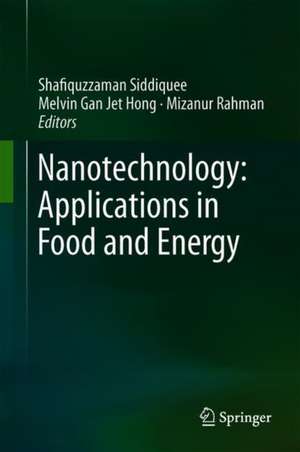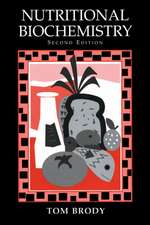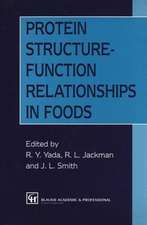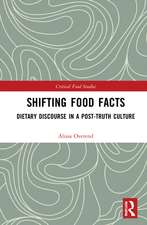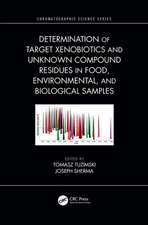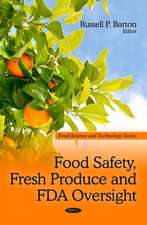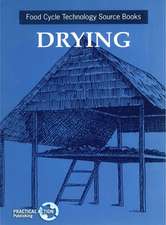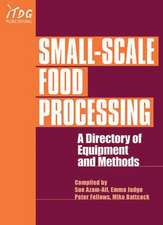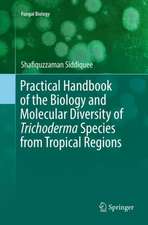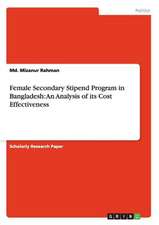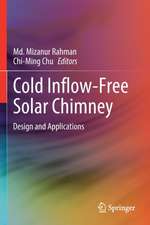Nanotechnology: Applications in Energy, Drug and Food
Editat de Shafiquzzaman Siddiquee, Gan Jet Hong Melvin, Md Mizanur Rahmanen Limba Engleză Hardback – 14 feb 2019
Applications of nanotechnology are the remarkable sizes dependent on physiochemical properties of nanomaterials that have led to the developed protocols for synthesizing nanomaterials over a range of size, shapes and chemical compositions. Nanomaterials are normally powders composed of nanoparticles which exhibit properties that are different from powders. Nanotechnology is the engineering of functional systems at the molecular scale with their wide applications in energy sector, including -but not limited to- energy resources, energy conversion, energy storage, and energy usage; drug delivery systems including- safety concerns, perspective, challenges, target therapeutics for cancer, neurodegenerative diseases and other human diseases, nanomaterials based tissue engineering; and food sectors including to- food safety and quality, opportunities, challenges, nanomaterials based enhancing food packing, and determination of foodborne pathogens, agro and marine food, analysisof market, regulations and future prospects.
The utilization of nanotechnology in the energy field will be emphasized and highlighted, in accordance to their prominent and high impact in this particular field. Recent trends and significant benefits of nanotechnology in the energy field will be revealed to the readers, and their promising advanced applications will be discussed.
The current drug discovery paradigm constantly needs to improve, enhance efficiency and reduce time to the market on the basis of designing new drug discovery, drug delivery and pharmaceutical manufacturing. In this book will be highlighted nanotechnology based drug delivery is an important aspect of medicine, as more potent and specific drugs that are particularly discussed the understanding of disease pathways. Several biomaterials can be applied to small-molecule drugs as controlled release reservoirs for drug delivery and provide new insights into disease processes, thus understanding the mechanisms of action of drugs.
Applications of food nanotechnology are an area of emerging interest for the food industry, for the reason, in this book will be given more priority to discuss the uses of nanomaterials for food packing, food safety and quality, and to remove the contaminated or spoiled by foodborne pathogens. And also nanotechnology based food products will be discussed how making them tastier, healthier, and more nutritious such as vitamins, to reduce fat content, and to ensure they do not degrade during a product’s shelf life.
Nanotechnology is basically the uses of nanomaterials, devices and systems through the control of matter on the nanometer scale. Multidisciplinary studies are required the technology for discovery and moving so fast from concept to the reality. Nanotechnology always not only provided more benefits in energy, drugs and food products but also provided significantly benefits around multidisciplinary field applications.
The utilization of nanotechnology in the energy field will be emphasized and highlighted, in accordance to their prominent and high impact in this particular field. Recent trends and significant benefits of nanotechnology in the energy field will be revealed to the readers, and their promising advanced applications will be discussed.
The current drug discovery paradigm constantly needs to improve, enhance efficiency and reduce time to the market on the basis of designing new drug discovery, drug delivery and pharmaceutical manufacturing. In this book will be highlighted nanotechnology based drug delivery is an important aspect of medicine, as more potent and specific drugs that are particularly discussed the understanding of disease pathways. Several biomaterials can be applied to small-molecule drugs as controlled release reservoirs for drug delivery and provide new insights into disease processes, thus understanding the mechanisms of action of drugs.
Applications of food nanotechnology are an area of emerging interest for the food industry, for the reason, in this book will be given more priority to discuss the uses of nanomaterials for food packing, food safety and quality, and to remove the contaminated or spoiled by foodborne pathogens. And also nanotechnology based food products will be discussed how making them tastier, healthier, and more nutritious such as vitamins, to reduce fat content, and to ensure they do not degrade during a product’s shelf life.
Nanotechnology is basically the uses of nanomaterials, devices and systems through the control of matter on the nanometer scale. Multidisciplinary studies are required the technology for discovery and moving so fast from concept to the reality. Nanotechnology always not only provided more benefits in energy, drugs and food products but also provided significantly benefits around multidisciplinary field applications.
Preț: 1121.62 lei
Preț vechi: 1367.82 lei
-18% Nou
Puncte Express: 1682
Preț estimativ în valută:
214.65€ • 223.27$ • 177.21£
214.65€ • 223.27$ • 177.21£
Carte tipărită la comandă
Livrare economică 14-28 aprilie
Preluare comenzi: 021 569.72.76
Specificații
ISBN-13: 9783319996011
ISBN-10: 3319996010
Pagini: 385
Ilustrații: XIII, 439 p. 157 illus., 113 illus. in color.
Dimensiuni: 155 x 235 mm
Greutate: 0.81 kg
Ediția:1st ed. 2019
Editura: Springer International Publishing
Colecția Springer
Locul publicării:Cham, Switzerland
ISBN-10: 3319996010
Pagini: 385
Ilustrații: XIII, 439 p. 157 illus., 113 illus. in color.
Dimensiuni: 155 x 235 mm
Greutate: 0.81 kg
Ediția:1st ed. 2019
Editura: Springer International Publishing
Colecția Springer
Locul publicării:Cham, Switzerland
Cuprins
Nanotechnology: Recent Trends in Food Safety, Quality and Market Analysis.- Improvement of Food Packaging based on Functional Nanomaterials.- Nanotechnology Applications in Food: Opportunities and Challenges in Food Industry.- Applications of Nanotechnology in Marine and Agro - based Products.- Applications of Polymeric Nanoparticles in Food Sector.- Advanced Analytical Methods for the Analysis of Food Products.- Nanosensors based Detection of Foodborne Pathogens.- Carbon Nanomaterials for Energy Storage Devices.- Zinc based spinel oxides for energy conversion and storage applications.- Nanotechnology in Renewable Energy: Critical Reviews for Wind Energy.- Nanocoating for Efficient Energy Conversion.- Nanomaterials: Electromagnetic Wave Energy Loss.- Promising Nanotechnology for Photovoltaic Cells.- Nanotechnology: Emerging Opportunities for Fuel Cell Application.- Application of Nanotechnology in Energy Efficient Lighting System.
Notă biografică
Shafiquzzaman Siddiquee is a Professor in the Biotechnology Research Institute at Universiti Malaysia Sabah in Sabah, Malaysia.
Melvin Gan Jet Hong is a Professor in the Faculty of Engineering at Universiti Malaysia in Sabah, Malaysia.
Mizanur Rahman is a Professor in the Faculty of Engineering at Universiti Malaysia in Sabah, Malaysia.
Textul de pe ultima copertă
Applications of nanotechnology are the remarkable sizes dependent on physiochemical properties of nanomaterials that have led to the developed protocols for synthesizing nanomaterials over a range of size, shapes and chemical compositions. Nanomaterials are normally powders composed of nanoparticles which exhibit properties that are different from powders. Nanotechnology is the engineering of functional systems at the molecular scale with their wide applications in energy sector, including -but not limited to- energy resources, energy conversion, energy storage, and energy usage; drug delivery systems including- safety concerns, perspective, challenges, target therapeutics for cancer, neurodegenerative diseases and other human diseases, nanomaterials based tissue engineering; and food sectors including to- food safety and quality, opportunities, challenges, nanomaterials based enhancing food packing, and determination of foodborne pathogens, agro and marine food, analysisof market, regulations and future prospects.
The utilization of nanotechnology in the energy field will be emphasized and highlighted, in accordance to their prominent and high impact in this particular field. Recent trends and significant benefits of nanotechnology in the energy field will be revealed to the readers, and their promising advanced applications will be discussed.
The current drug discovery paradigm constantly needs to improve, enhance efficiency and reduce time to the market on the basis of designing new drug discovery, drug delivery and pharmaceutical manufacturing. In this book will be highlighted nanotechnology based drug delivery is an important aspect of medicine, as more potent and specific drugs that are particularly discussed the understanding of disease pathways. Several biomaterials can be applied to small-molecule drugs as controlled release reservoirs for drug delivery and provide new insights into disease processes, thus understanding the mechanisms of action of drugs.
Applications of food nanotechnology are an area of emerging interest for the food industry, for the reason, in this book will be given more priority to discuss the uses of nanomaterials for food packing, food safety and quality, and to remove the contaminated or spoiled by foodborne pathogens. And also nanotechnology based food products will be discussed how making them tastier, healthier, and more nutritious such as vitamins, to reduce fat content, and to ensure they do not degrade during a product’s shelf life.
Nanotechnology is basically the uses of nanomaterials, devices and systems through the control of matter on the nanometer scale. Multidisciplinary studies are required the technology for discovery and moving so fast from concept to the reality. Nanotechnology always not only provided more benefits in energy, drugs and food products but also provided significantly benefits around multidisciplinary field applications.
The utilization of nanotechnology in the energy field will be emphasized and highlighted, in accordance to their prominent and high impact in this particular field. Recent trends and significant benefits of nanotechnology in the energy field will be revealed to the readers, and their promising advanced applications will be discussed.
The current drug discovery paradigm constantly needs to improve, enhance efficiency and reduce time to the market on the basis of designing new drug discovery, drug delivery and pharmaceutical manufacturing. In this book will be highlighted nanotechnology based drug delivery is an important aspect of medicine, as more potent and specific drugs that are particularly discussed the understanding of disease pathways. Several biomaterials can be applied to small-molecule drugs as controlled release reservoirs for drug delivery and provide new insights into disease processes, thus understanding the mechanisms of action of drugs.
Applications of food nanotechnology are an area of emerging interest for the food industry, for the reason, in this book will be given more priority to discuss the uses of nanomaterials for food packing, food safety and quality, and to remove the contaminated or spoiled by foodborne pathogens. And also nanotechnology based food products will be discussed how making them tastier, healthier, and more nutritious such as vitamins, to reduce fat content, and to ensure they do not degrade during a product’s shelf life.
Nanotechnology is basically the uses of nanomaterials, devices and systems through the control of matter on the nanometer scale. Multidisciplinary studies are required the technology for discovery and moving so fast from concept to the reality. Nanotechnology always not only provided more benefits in energy, drugs and food products but also provided significantly benefits around multidisciplinary field applications.
Caracteristici
Comprehensively outlines the application of food nanotechnology, including individual chapters cover the application of nanomaterials for food packing, food safety and quality and the removal of foodborne pathogens Covers the application of nanotechnology in the energy field, including recent trends, significant benefits and promising advanced applications for use in storage devices, renewable energy, fuel cells and lighting systems Provides researchers with an up-to-date source covering all aspects of nanotechnology application in the food and energy sectors, including essential coverage of all the important advances, current applications and future directions for the application of nanomaterials in these fields
